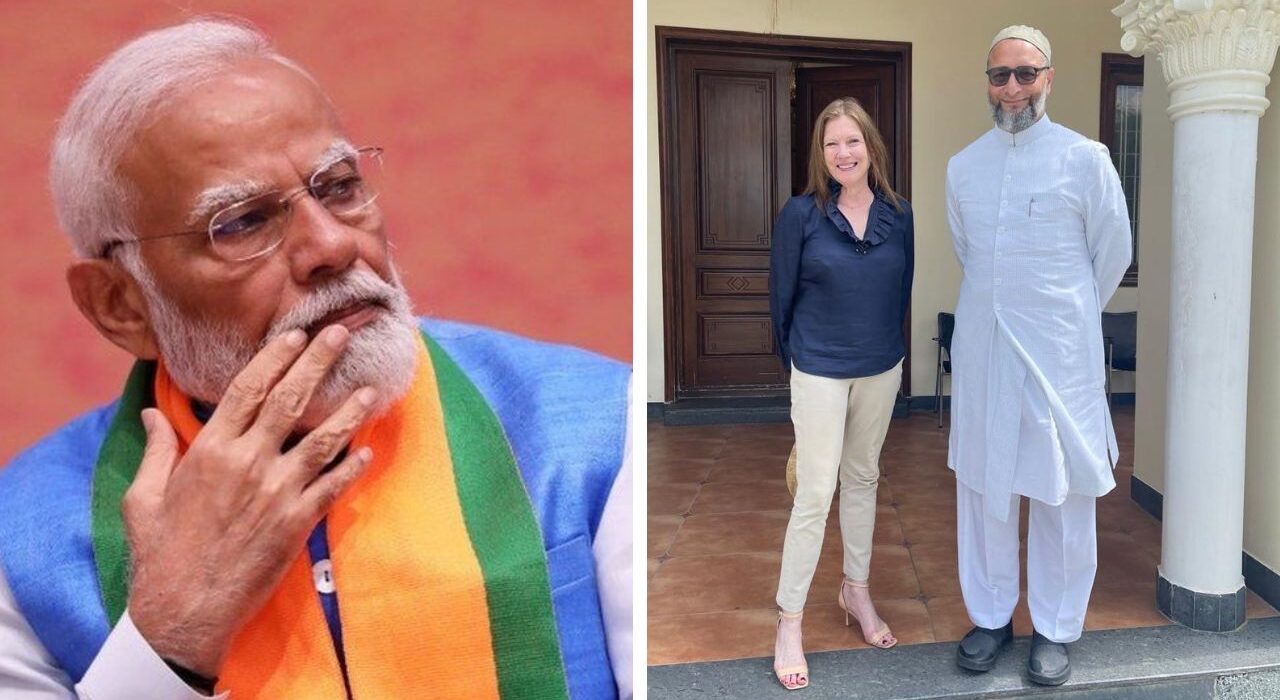Recent diplomatic visits by American officials in India have raised eyebrows within the country’s political and intelligence circles as US Secretly Interfering In Indian Politics. The focus has primarily been on a series of meetings involving US Consul General Jennifer Larson who heads the American mission in Hyderabad and prominent Indian opposition leaders.
Jennifer Larson’s meeting with Hyderabad MP Asaduddin Owaisi who is the leader of the All India Majlis-e-Ittehadul Muslimeen (AIMIM) has caused a lot of attention as US secretly interfering in Indian politics. This was their second encounter in recent weeks leading to speculation on Indian social media regarding the motive behind these discussions. Concerns have been raised about the frequency and nature of these meetings with questions emerging about the agenda being discussed behind closed doors leading to US secretly interfering in Indian politics.
Thank you, Member of Parliament and leader of AlMIM @asadowaisi for your kind hospitality and for sharing your informed and important views on a range of shared issues and concerns. I look forward to continuing our discussions! #USIndiaFWD pic.twitter.com/WsDTVzKI0h
— Consul General Jennifer Larson (@USCGHyderabad) August 12, 2024
In addition to meeting Owaisi Larson has also engaged in talks with Telangana Chief Minister and N Chandrababu Naidu who is the the Chief Minister of Andhra Pradesh. Notably Naidu has expressed strong opposition to the proposed “Unified Waqf Management, Empowerment, Efficiency and Development Act.” This bill backed by the ruling BJP aims to regulate properties managed by Waqf boards,which are predominantly Islamic institutions. Reports suggest that Waqf properties are among the largest landowners in India making this a legislative move.
Political Repercussions of the Diplomatic Visits
The timing of these meetings and the stance taken by Naidu against the proposed Waqf law have caused unease within BJP circles. There are growing concerns that internal political issues may be discussed during these diplomatic encounters potentially leading to instability. Some intelligence sources have even hinted at the possibility of a no-confidence motion being explored by opposition leaders with foreign backing.
There are also claims that certain religious institutions such as the Andhra Baptist Church might be leveraged as pressure points against Naidu. Speculation suggests that these organizations which receive financial support from overseas entities could be used to sway political allegiances in the region.
Historical Context and Strategic Importance
While meetings between foreign diplomats and opposition leaders are not uncommon recent developments have drawn increased attention. The Andhra-Telangana region holds strategic importance due to its strong Information Technology (IT) industry and significant connections with the United States. However these latest interactions have triggered concerns particularly in light of the global political climate.
Some intelligence sources have downplayed the situation suggesting that foreign diplomats meeting with Indian opposition leaders is a long-standing tradition. Given that India has one of the largest Muslim populations in the world it is seen as natural for a US diplomat to engage with a leader like Owaisi who represents a large section of this community.
Also Read: Nirbhaya’s Mother Calls for Mamata Banerjee’s Resignation As She Failed To Give Justice to Victim
Foreign Influence and Internal Stability
Experts remain cautious as Dr. Abhinav Pandya who is the founder of the Usanas Foundation and is a prominent Indian think tank has voiced concerns over the potential for foreign interference aimed at destabilizing India. He notes that there are genuine fears within BJP and RSS circles that foreign powers could seek to undermine the current government due to its independent foreign policy stance.
Pandya highlights examples from neighboring countries like Pakistan and Bangladesh where foreign influence is believed to have played a role in political upheavals. The pattern of diplomatic engagement particularly in sensitive political contexts raises questions about potential motivations.
Quiet Diplomacy During High Stakes
During these developments Indian Foreign Secretary Vinay Mohan Kwatra’s recent visit to Washington has garnered attention. Despite the low-key public messaging surrounding the visit insiders suggest it was a crucial meeting focused on global politics and security. The discussions reportedly covered regional dynamics including developments in China, the Indo-Pacific, and India’s neighboring countries like Nepal, Bangladesh and Myanmar.
The visit also addressed strategic cooperation between India and the US touching on defense projects, technology partnerships and energy collaborations. Both countries reiterated their commitment to maintaining strong ties, despite the noise surrounding internal political matters.
Also Read: Sabarmati Express Derails Near Kanpur: 22 Coaches Off Track And Past Incidents Raise Concerns
